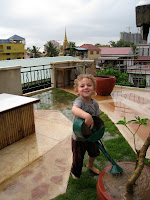First translation-let the learning curve begin
Oh my… First day working with a translator and I fear this is going to be much more difficult than I expected. In fact I admit I’m a bit afraid. It’s about translation and expression, perhaps language itself and the way people have access to it. I have to remind myself that the people who were educated in Cambodia were killed under the Khmer Rouge regime. Those who survived the regime were often the farmers or otherwise manual laborers. The people I encounter who speak French and English well most often weren’t here during that time. They managed to escape or were away when the evacuations began. And while the regime was overthrown more than thirty years ago, there were lingering effects. I read of parents not wanting to send their children to school because they saw what happened to educated people, and how could they be sure it wouldn’t happen again? This differs so profoundly from Iraq where almost everyone I met was educated to some degree, with most city-dwellers I met holding at least a bachelor’s degree, if not a Masters and more. Many spoke English or at least understood some of it. The translators we worked with were educated at least in part in England and France. So even though Arab culture and people were so different from what I knew, I didn’t feel as far away from them. That’s not the case here. At least for now. It doesn’t mean this divide can’t be overcome; it just means that each interview will take more time, better translation, more patience, more relationship building and understanding. I’ll have to continue my search for a translator with whom I can work for the whole project because this relationship is crucial. Understanding one’s perception of a question – by defining justice, I am not (only) asking how many years leaders should spend in prison, for example – as well as pronunciation particularities can make or break an interview.
Take one of today’s more comical exchanges, which unfortunately revolved around someone’s terribly traumatic moment: I was asking a woman to describe an important memory, good or bad.
“She was carrying the ground”, the translator tells me. “It was so hard for her.”
“The ground?”
“Yes, to a field.”
“Carrying the ground to a field…” I repeat in the hope that by hearing his own words he might also recognize the not exactly clear nature of what he is saying. No dice. I have to guess. What could she carry to a field, I wonder. “Maybe dirt? Was she carrying dirt?” I ask. Translator nods excitedly. “Yes, then she had to carry a “seed” with her hands.”
“Seed to plant? In the ground with the dirt?”
“No SEED”
“A seat? Like a chair? Maybe for the soldiers?”
“No! SEED SEED SEED. From the button. You understand?!”
No I didn’t understand and despite my best efforts not to, had to chuckle at his exasperated look. A room full of old Cambodian women watched my face. Then it hit me “oh, SHIT! Did she have to carry Shit??”
“Yes!!”
“Then she was climbing on top a tunnel she fell and soldier blame her. She thought she going die but then carry seed.
“Carry seed again?” I ask.
“No this happen before”
“… oh.”
Ok, so with a bit more time I will catch context/timing much more quickly, but at the outset I don’t want to assume that a KR soldier made this woman carry shit back and forth to a field because she accidentally fell down. Of course he would. He did that and more. I just need the language to understand it. And I need more. Not just the events but feelings, which are so rare here. Even the word “emotion” is different. In a TPO meeting the other day the lead psychologist was discussing people’s emotional response and spoke at length in Khmer but interjected the English word “emotion” throughout. I still have to ask about this discrepancy, and also remember that raw emotion is still not a cultural trait here. Indeed, who would want to feel after what they’ve gone through?














